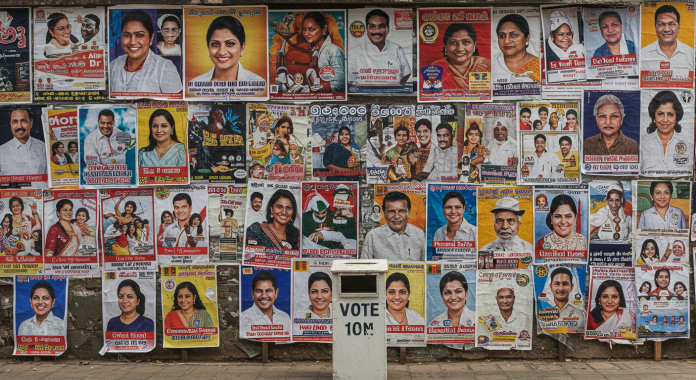BY Methmalie Dissanayake
As Sri Lanka edges closer to long-overdue local government elections, a recent initiative has taken steps to equip the next generation of political candidates—especially youth, women, and newcomers—with the tools they need to campaign ethically, communicate effectively, and navigate the complex web of electoral law.
The programme, a collaborative effort between the Institute of Democracy and Governance (IDAG), PAFFREL, and the National Movement for a Just Society (NMSJ) with the guidance of the Election Commission of Sri Lanka, brought together veteran election officials, legal minds, and communications experts in an effort to level the playing field for all candidates. At its heart is a singular goal: a free and fair election.
“This is more than an information session,” explained Saroj Pathirana, a representative of IDEA, at the opening of the event. “It’s about shaping a culture of democratic responsibility and good governance.” He stressed that local government representatives, though often overlooked, play a critical role in the country’s political ecosystem. “We’re not just preparing people to contest—this is about building integrity-driven leaders.”
The Rulebook for Democracy
Few understand the election process as intimately as Mahinda Deshapriya, the former Chairman of the Election Commission. Drawing on decades of experience, Deshapriya offered a no-nonsense guide to the legal and ethical boundaries that all candidates must follow.
He issued a stark reminder: “There is no opposition in local government. Once elected, everyone works together.” This, he noted, demands a spirit of cooperation and a commitment to the public good. Deshapriya cautioned against the misuse of religious institutions, government positions, or public property for political gain—practices that have become all too common in the country’s political landscape.
Deshapriya also warned candidates to avoid common pitfalls: illegal processions, unauthorised posters, inducements to voters, and hate speech. “You’re not above the law just because you’re running for office,” he said, urging aspirants to study the Local Authorities Elections Ordinance and adhere to the Code of Conduct issued by the Election Commission.
Money Talks—But It Shouldn’t Decide
If the law is one pillar of fair elections, campaign finance is another—and perhaps the most overlooked. Rohana Hettiarachchi, Executive Director of PAFFREL, laid bare the new regulations aimed at curbing runaway election spending.
“These rules are designed to democratise access to power,” he said, explaining that strict spending limits now apply to every candidate based on the number of registered voters in their area. He detailed a system that divides campaign funds among individual candidates, parties, and listed candidates, while firmly outlawing donations from state institutions, foreign governments, or anonymous sources.
Hettiarachchi issued a serious warning: candidates who violate these rules could face fines, disqualification from future elections, and even loss of office. “This is not just paperwork. This is about protecting democracy from being sold to the highest bidder.”
The Law and Order Mandate
Ensuring these laws are upheld is the responsibility of the Sri Lanka Police, a point made emphatically by former Senior DIG Gamini Navaratne. “Elections are a test of our legal and civic maturity,” he said. “The world is watching.”
Navaratne explained that special police units are on standby across the country, ready to investigate any breaches of election law. He urged candidates to understand their legal obligations and to ensure that their supporters do the same. “Ignorance is not an excuse. Even the best-intentioned campaigns can be undone by a single illegal act.”
Winning Minds, Not Just Votes
In the digital age, campaigning is not just about policies—it’s about storytelling. Communication strategist Chameera Dedduwage delivered perhaps the most practical segment of the programme, focusing on how to craft compelling, honest campaigns within the legal and ethical limits.
“Good communication isn’t just what you say—it’s how you live,” he said. Dedduwage advised candidates to build their campaigns around authenticity, integrity, and local connection. He emphasised the rising importance of digital platforms like Facebook, YouTube, and TikTok—tools that can amplify a candidate’s voice without breaking the bank.
He offered guidance on building simple, cost-effective websites and using printed material creatively—such as using QR codes to link physical leaflets with online platforms. But above all, he reminded participants that messaging should be rooted in truth, values, and service. “You need a story that resonates. Not an image, but a message.”
His “Message, Messenger, Delivery, Audience” framework challenged candidates to think deeply about what they are offering voters, and how best to communicate it.
A New Political Culture
The underlying theme running through the programme was the call for a new political culture—one grounded in law, transparency, ethics, and public service.
In a political landscape too often dominated by money, power, and patronage, this initiative represents a timely intervention. It offers hope that the next generation of local leaders will not only understand the rules of the game but will change it for the better.
As one speaker aptly put it, “Winning the election is not the end. It’s the beginning of your accountability.”




